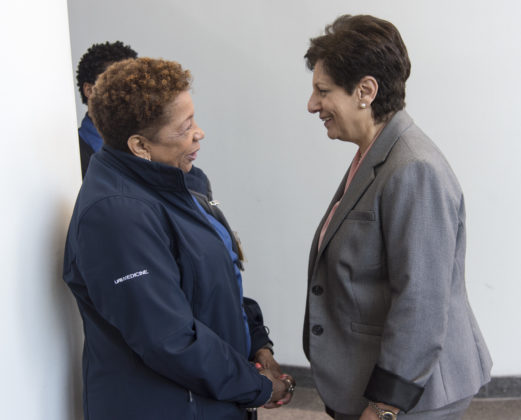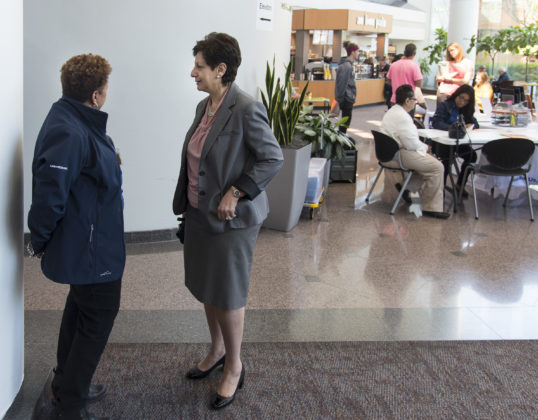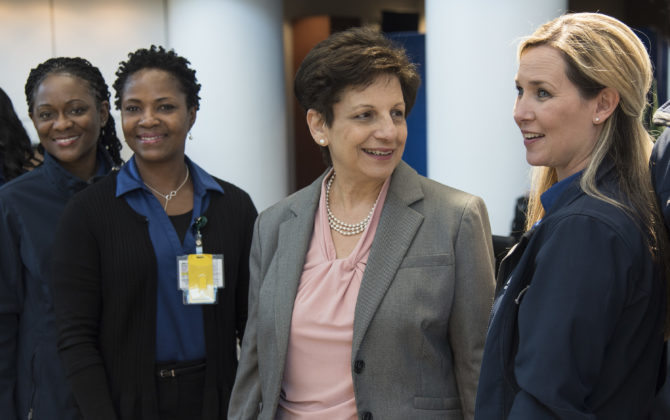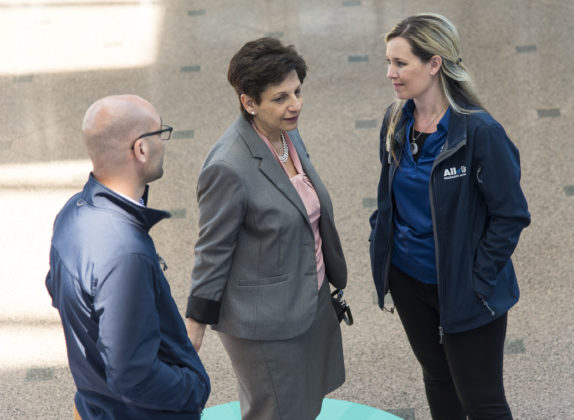
Times staff report
When the University of Alabama at Birmingham (UAB) received a $45 million, five-year funding award from the National Institutes of Health (NIH) to support a nationwide research program to advance individualized prevention, treatment and care for people of all backgrounds, it was no surprise that Mona Fouad, M.D., was selected to help lead the program at UAB.
The All of Us Research Program aims to improve overall health and treat disease by encouraging the public to take an active role in steering the future of health research.
Fouad is professor and director of UAB’s Minority Health & Health Disparities Research Center (MHRC) and one of the investigators on the investigative team for All of Us who is responsible for enrolling participants as well as recruitment of the participants for All of Us.
Given her work with the MHRC she was a natural to join colleagues at the university in leading the program including Bruce R. Korf, M.D., Ph.D., the School of Medicine’s chief genomics officer and Cora E. Lewis, M.D., chair of the Department of Epidemiology in the School of Public Health.
The goal for the entire Southern Network of All of Us is 20,000 participants per year for five years, for a total of 100,000. The Southern Network is Alabama, Mississippi and Louisiana.
To reach the enrollment figures, Fouad said, “we have sites all over [the]UAB campus and . . . in Selma, Montgomery, Mobile, and in Mississippi and Louisiana. But here at UAB we have [sites] in different clinics like” The Kirklin Clinic of UAB Hospital and UAB Hospital-Highlands, she said.
In a series of interviews, Fouad and other UAB medical professionals spoke about benefits of the All of Research program. Here are edited excerpts from the interviews:
Fouad
Why is it important to have representation from all people and all communities by age, gender, ethnicity, race, location?
Because this is more personalized; and for us to be able to develop the best care or treatment for people, you really have to have this diversity to understand how you can deliver care to everybody no matter what their background is . . . like if they’re older, if they’re younger, if they’re women, if they’re African Americans or Hispanic, if they come from rural areas where they may be exposed to different environmental problems . . . that’s why it is very important to have diversity in participation in this study.”
How would you describe the need of [precision] medicine to each individual because of their differences?
“For example, it’s not just their differences but also how the disease is different. Like, if you’re treating breast cancer, the incidence of breast cancer is higher in white women over the age of 50, but the incidence of it is higher for African American women at a younger age and the kind of cancer and how it behaves at a younger age is different than when it comes to women at an older age. Usually, when it’s in a younger age, it’s more aggressive, it’s faster . . . that’s an example of if we want to treat the more aggressive cancer or breast cancer in younger women we can do the same treatment like we do for older women . . . since African American women get it more at a younger age, we need to understand what is the nature of that disease more, so we can treat it more effectively.”
Bruce R. Korf, MD, PhD, the Chief Genomics Officer, UAB Medicine and co-principal investigator of the All of Us Southern Network.
Why is All of Us Research important, specifically for this [Southern] network?
“All of Us is going to be collecting the data that will fuel precision medicine for the coming generation. It will help reveal the individual risk factors for diseases and how one person differs from another in terms of how you should be treating them. That’s the big picture of what All of Us will accomplish. The All of Us study is important in our region because there are populations in our area that could be at great risk of being left out of this process if we don’t work hard to engage them. If all people in our region are going to benefit from what is learned from All of Us, it will be critical that we work with them to earn their trust and support their participation in the project.”
Talk about the need for diversity with the program
“People differ from one another in many ways, including in their genetic constitution. For example, some may have higher chances of responding to one particular medicine than another. We will only know this if diverse populations in our region are represented in the data collection that will ultimately inform us how to make the best medical decisions for persons of all backgrounds.”
Cora Beth Lewis, M.D., Professor and Chair of the Department of Epidemiology in the School of Public Health at UAB, Co-Primary Investigator for All of Us.
What makes All of Us different from other research programs?
Up until this point researchers would say ‘this person has this kind of cancer, it’s in their lung and it looks like this kind of cell.’ So precision medicine says, ‘well, what’s going on in that cell that makes it turn into cancer?’ The way that we’ve been able to treat cancer before is ‘Well, you have this type of cancer, so we’ll treat it with this kind of stuff.’ Now the idea is to say, ‘this is what’s going on, these are the changes that have occurred and this medicine attacks the process (in that particular person)’.
What are the needs for this program and what are the benefits of participating?
A lot of people join in the study because they want to make things better for their grandkids or family. We’re also doing something unique by involving the participants in the study. We’re putting together an advisory board of people who’ve already joined the study. That’s happening nationally. It’s happening in our network. We want the participants to say what they liked and didn’t like, what they’re interested in. We want to involve them in the study. The study data will be available to scientists, citizen scientists. We will return the results to the participants and talk to them about what this might mean. We want participants to help drive the study.
For more information call (833) JOIN-UAB, email allofus@uabmc.edu, or visit JoinAllofUs.org/southern.








